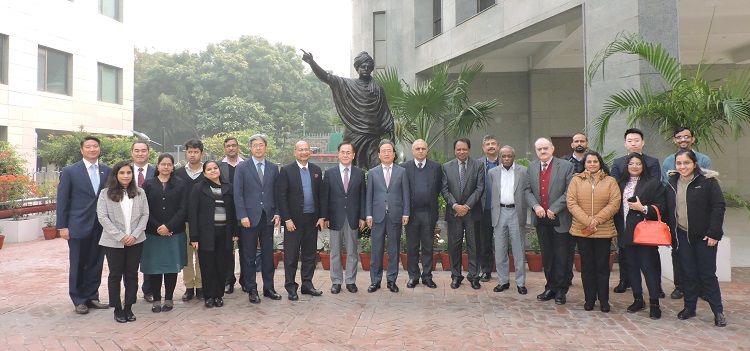

The Vivekananda International Foundation organized a joint closed-door seminar with the Embassy of Republic of Korea on 20 December 2019 to discuss ‘Peace and Denuclearization on the Korean Peninsula’. After opening remarks by Dr Arvind Gupta, Director VIF; Ambassador Shin Bong Kil gave the inaugural remarks. The presentations from the South Korean side were made by Mr Kwan-Sei Lee, Director of the Institute for Far Eastern Studies (IFES) and Former Vice-Minister of Unification and Mr Byong-Chul Lee, Research Professor, IFES. The presentations from the Indian side were delivered by Ambassador T.P. Sreenivasan, Former Indian Ambassador to Austria, as well as Permanent Representative of India to the United Nations and the International Atomic Energy Agency, Vienna and Ambassador Vishnu Prakash, Former Indian Ambassador to South Korea.
The discussions deliberated on the diplomatic lull after the Hanoi Summit and the potential unravelling of the thaw between the US and North Korea. The high-level diplomacy of 2017-2018 for enabling peace and stability on the Korean Peninsula was relegated a back seat in 2019. Though the crisis with North Korea is less acute now than it was in 2016-2017, but the progress is modest and subject to change at any moment. Many other issues have taken the centre stage in US foreign policy. Last round of talks between the US and North Korean interlocutors in Stockholm, Sweden, on 5 October 2019 failed to make headway. There is serious contradiction in view on sanctions relief. The US thinks of sanctions relief as the supreme economic inducement for denuclearization; the North Koreans believe it is a prerequisite for improved relations. Since May 2019, North Korea has tested more missiles than it has in any other year in its history except possibly 2016.

While North Korea does not want to return to the pre-Singapore Summit situation, it wants to avoid giving the US advantage in the negotiations. China and Russia mitigate the impact of sanctions on North Korea. The idea of security guarantees to the North Korean regime was also vigorously debated. The emergence of a nascent Market Economy in North Korea has provided it more resilience than earlier imagined. On the question of India’s Role in the North Korean crisis, it was maintained that while India had a limited role, it had an abiding interest in peace and stability of Korean peninsula. While there was a flourishing strategic partnership with South Korea, there was deep concern on help received by Pakistan from North Korea. India, thus shares international community’s concerns with regard to North Korea’s destabilizing activities which adversely impact peace and stability in the region and beyond. India has called upon North Korea to refrain from such actions.
Links:
[1] https://www.vifindia.org/event/report/2020/march/21/vif-embassy-of-rok-seminar-on-prospects-of-peace-and-denuclearization
[2] https://www.vifindia.org/author/prerna-gandhi
[3] http://www.facebook.com/sharer.php?title=VIF-Embassy of ROK Seminar on Prospects of Peace and Denuclearization on the Korean Peninsula&desc=&images=https://www.vifindia.org/sites/default/files/20-dec-2019.jpg&u=https://www.vifindia.org/event/report/2020/march/21/vif-embassy-of-rok-seminar-on-prospects-of-peace-and-denuclearization
[4] http://twitter.com/share?text=VIF-Embassy of ROK Seminar on Prospects of Peace and Denuclearization on the Korean Peninsula&url=https://www.vifindia.org/event/report/2020/march/21/vif-embassy-of-rok-seminar-on-prospects-of-peace-and-denuclearization&via=Azure Power
[5] whatsapp://send?text=https://www.vifindia.org/event/report/2020/march/21/vif-embassy-of-rok-seminar-on-prospects-of-peace-and-denuclearization